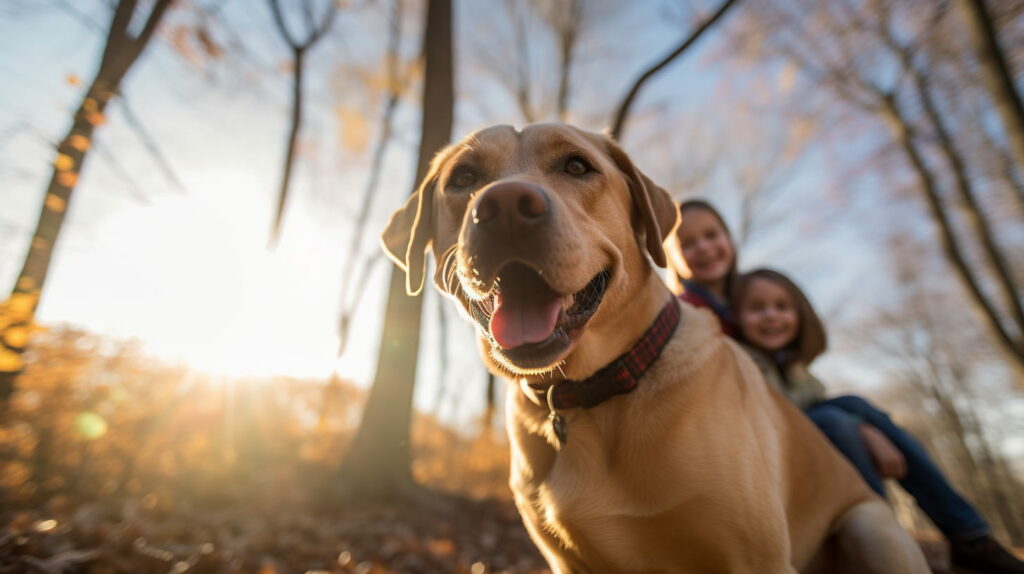As a dog owner, you may have noticed your furry friend experiencing hiccups from time to time, leaving you wondering why. While hiccups in dogs are usually nothing to worry about, it's helpful to understand what causes them and how to provide relief.
In this article, we'll cover everything you need to know about dog hiccups, including common causes, signs, and remedies. You'll learn how to prevent hiccups in the future and when it's necessary to seek veterinary care. We'll even bust some common myths and offer tips for maintaining your dog's overall well-being.

Key Takeaways:
- Dog hiccups are typically harmless and temporary
- Hiccups may be caused by eating too quickly, excitement, stress, or changes in temperature
- Symptoms of hiccups include rhythmic contractions in the diaphragm and short, high-pitched noises
- Remedies for dog hiccups include massaging their belly, offering water, and distracting them with play or treats
- Preventive measures include feeding smaller, more frequent meals and avoiding sudden temperature changes
- Consult a veterinarian if hiccups last for an extended period or are accompanied by other symptoms
Understanding Dog Hiccups
Hiccups can be a common occurrence in dogs, particularly in puppies. They are usually harmless and temporary, but it's essential to understand their causes to prevent them from occurring frequently. Here are some of the common reasons for dog hiccups:
| Causes of Dog Hiccups |
|---|
| Eating too quickly or drinking too much water |
| Excitement or stress |
| Changes in temperature |
These are not the only causes of dog hiccups, but they are the most common. You'll probably notice hiccups in your dog when they occur. The following are some signs that indicate your dog is experiencing hiccups:
- Repeated, rhythmic contractions in the diaphragm
- Muted or high-pitched squeaky noises
- A temporary pause in activity
If you notice these signs, don't worry too much. Hiccups in dogs usually go away on their own. However, if hiccups persist for an extended period, it's best to contact your veterinarian. In the next section, we'll provide tips on how to stop dog hiccups.
Signs of Dog Hiccups
Just like humans, dogs have signs that indicate they are experiencing hiccups. Recognizing these signs can help you comfort your furry friend and provide the necessary relief. Here are the common signs of dog hiccups:
- Repeated, rhythmic contractions in the diaphragm that are visible or palpable
- Muted or high-pitched squeaky noises
- A temporary pause in activity, such as stopping eating or playing
If your dog is showing any of these signs, they may be experiencing hiccups. While dog hiccups are usually harmless and temporary, it's still important to monitor your pet and offer them comfort and care.
How to Stop Dog Hiccups
While dog hiccups are generally harmless, they can be distressing for your pet. Here are some ways to help your furry friend find relief from hiccups:
| Method | Description |
|---|---|
| Massage | Gently massage your dog's belly to help relax their diaphragm and ease the hiccups. |
| Water | Offer your dog small sips of water to help soothe their throat and calm their breathing. |
| Distraction | Distract your dog with play or treats to redirect their attention and alleviate stress. |
| Relaxation | Allow your dog to rest in a calm and quiet environment to help reduce anxiety and calm their breathing. |
Please note that these methods are intended for occasional hiccups and should not be used as a replacement for veterinary care if the hiccups persist or are accompanied by other concerning symptoms.
Additional Tips:
- Avoid feeding your dog large meals all at once to prevent overeating and hiccups.
- Provide a peaceful environment with minimal noise and distractions to help reduce anxiety and stress.
- Try to maintain a consistent temperature in your home to avoid sudden changes that can trigger hiccups.
Remember, hiccups are a common and usually harmless occurrence in dogs. By following these tips, you can help your furry friend find relief and maintain their overall health and well-being.
Prevention Techniques for Dog Hiccups
Preventing dog hiccups is all about being mindful of your furry friend's habits and taking steps to reduce potential triggers. Here are some tips to help:
- Feed your dog smaller, more frequent meals, rather than one or two large meals a day. This will prevent them from inhaling too much air while eating, which can lead to hiccups.
- Avoid feeding your dog right before or after exercise, as this can also cause hiccups.
- Ensure that your dog is in a peaceful and stress-free environment. Loud noises or sudden changes in temperature can lead to hiccups.
- Make sure your dog has access to plenty of fresh water throughout the day. Dehydration can cause hiccups, among other health problems.
By implementing these preventive measures, you can reduce the likelihood of your dog experiencing hiccups and ensure their continued health and happiness.
When to Seek Veterinary Care for Dog Hiccups
Most of the time, dog hiccups are harmless and will resolve on their own within a few minutes. However, there are some situations where you should seek veterinary care.
If your dog's hiccups last for an extended period or occur frequently, it may be a sign of an underlying health issue that needs to be addressed. Additionally, if your dog is experiencing other symptoms such as vomiting, diarrhea, or difficulty breathing along with their hiccups, it's important to consult a veterinarian as soon as possible.
If your dog appears to be in distress or uncomfortable because of their hiccups, seeking veterinary care can help provide them with relief. Your veterinarian may be able to recommend medications or other treatments to help alleviate your dog's hiccups and prevent them from occurring again in the future.
It's essential to pay attention to your dog's behavior and symptoms and seek veterinary care if you have any concerns about their health and well-being. Remember, early intervention is key to ensuring the best possible outcome for your furry friend.
Common Misconceptions About Dog Hiccups
As with many pet-related issues, there are several myths and misconceptions surrounding dog hiccups. It's important to separate fact from fiction to ensure you're providing the best care possible for your furry friend.
Myth: Pulling on a dog's tongue will stop hiccups.
This is false and potentially harmful. Pulling, tugging, or even touching a dog's tongue can cause them to choke or vomit, which can lead to more serious issues.
Myth: Scaring a dog will cure hiccups.
This is also false and could lead to additional stress and anxiety for your dog. Scaring them may cause them to become alarmed or frightened, which could potentially make their hiccups worse.
Myth: Over-the-counter medications can help cure dog hiccups.
While some human medication can help alleviate hiccups, giving your dog these medications without veterinary guidance can be dangerous. Over-the-counter medication can interact negatively with other medications your dog may be taking or cause harmful side effects.
Instead of relying on these myths, it's best to provide safe and vet-approved remedies to alleviate your dog's hiccups.
Home Remedies for Dog Hiccups
Watching your dog suffer from hiccups can be distressing, but fortunately, there are several safe and effective home remedies that you can try to provide relief.
One simple approach is to offer your dog a small ice cube to lick or chew on. The cold temperature can help calm the diaphragm and stop hiccups.
Another popular remedy is a teaspoon of honey. The sweetness of the honey can stimulate the vagus nerve, which helps regulate breathing and may help stop hiccups.
You can also try making your dog swallow small amounts of peanut butter, which can help distract them from the hiccups and regulate their breathing. Just be sure to use natural, unsweetened peanut butter without any additives like xylitol, which can be toxic to dogs.
Other remedies include gently massaging your dog's chest or belly to soothe their diaphragm or giving them a small amount of chamomile tea, which can help relax their muscles and calm their nerves.
While these remedies are generally safe, it's important to use them in moderation and only under veterinary guidance. If your dog's hiccups persist or are accompanied by other concerning symptoms, it's best to seek professional care.

Other Tips for a Happy and Healthy Dog
While preventing hiccups is important for your dog's comfort, maintaining their overall health and happiness is equally essential. Here are some additional tips to keep in mind:
- Regular exercise: Make sure your dog gets enough physical activity every day. This can help reduce stress and prevent obesity, which can lead to a range of health issues.
- A balanced diet: Stick to a diet that is appropriate for your dog's age, breed, and weight. Providing proper nutrition can help prevent a range of health issues, from obesity to malnutrition.
- Mental stimulation: Dogs need mental stimulation just as much as physical exercise. Offer toys, games, and puzzles to keep your dog's mind engaged and prevent boredom.
- Regular vet checkups: Keep up with your dog's routine checkups and vaccinations. These visits can help detect any health issues early on and prevent more serious problems down the line.
By taking care of your dog's physical and mental health, you can help prevent a range of health issues, including hiccups.
Understanding Your Dog's Unique Needs
While occasional hiccups in dogs are typically harmless and temporary, some dogs may be more prone to hiccups due to certain factors. Understanding your individual dog's needs and behavior patterns is crucial in providing the best care possible.
Factors such as breed, age, and underlying health conditions can all play a role in determining your dog's likelihood of experiencing hiccups. For example, brachycephalic breeds such as bulldogs and pugs may be more susceptible to hiccups due to their short snouts and narrow airways.
Additionally, older dogs may experience more frequent hiccups as their digestive systems may not function as efficiently. Dogs with underlying health conditions such as gastroesophageal reflux disease (GERD) or irritable bowel syndrome (IBS) may also experience hiccups more frequently.
By understanding your dog's unique needs, you can take preventative measures to minimize the occurrence of hiccups, as well as provide the best care possible when they do occur. Consulting with your veterinarian can also help you better understand your dog's individual needs and develop a personalized care plan.
Conclusion
In conclusion, hiccups in dogs are a common occurrence that are usually harmless and temporary. It is important to understand the potential reasons for dog hiccups and recognize the signs that your dog is experiencing them. Providing your dog with practical tips and preventive measures can help alleviate their hiccups and maintain their overall health and well-being.
If your dog's hiccups persist or are accompanied by other concerning symptoms, it is important to seek veterinary care. Additionally, it is vital to avoid common misconceptions about dog hiccups and only use safe and vet-approved remedies.
Remember, understanding your individual dog's needs and behavior patterns is crucial in providing them with the best care possible. By following these tips and guidelines, you can ensure a happy and healthy life for your furry friend.
FAQ
Q: Why does my dog get hiccups?
A: Dog hiccups can be caused by factors such as eating too quickly, excitement, stress, or changes in temperature. Hiccups in dogs are usually harmless and temporary.
Q: What are the signs of dog hiccups?
A: Signs of dog hiccups include repeated, rhythmic contractions in the diaphragm, muted or high-pitched squeaky noises, and a temporary pause in activity.
Q: How can I stop my dog's hiccups?
A: To help your dog find relief from hiccups, you can try gently massaging their belly, offering small sips of water, distracting them with play or treats, or allowing them to rest in a calm and quiet environment.
Q: Are there any prevention techniques for dog hiccups?
A: To minimize the occurrence of hiccups in dogs, it is recommended to feed them smaller, more frequent meals, ensure they have a peaceful environment, and avoid sudden temperature changes.
Q: When should I seek veterinary care for dog hiccups?
A: It is necessary to consult a veterinarian if your dog's hiccups last for an extended period, are accompanied by other concerning symptoms, or if your dog appears to be in distress.
Q: What are some common misconceptions about dog hiccups?
A: Common misconceptions about dog hiccups include pulling on the dog's tongue, scaring them, or giving them over-the-counter medications. It is important to use safe and vet-approved remedies.
Q: Are there any home remedies for dog hiccups?
A: Some safe and effective home remedies for dog hiccups include offering ice cubes, giving them a teaspoon of honey, or making them swallow small amounts of peanut butter.
Q: What other tips can help keep my dog happy and healthy?
A: Maintaining your dog's overall well-being includes regular exercise, a balanced diet, and providing mental stimulation to reduce stress levels.
Q: How can I understand my dog's unique needs?
A: It is important to understand your individual dog's needs and behavior pat


